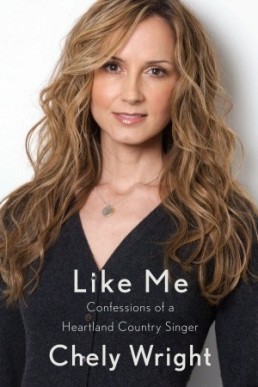Downloading Like Me: Confessions of a Heartland Country Singer

Chely Wright, singer, songwriter, country music star, writes in this moving, telling memoir about her life and her career; about growing up in America’s heartland, the youngest of three children; about barely remembering a time when she didn’t know she was different.
She writes about her parents, putting down roots in their twenties in the farming town of Wellsville, Kansas, Old Glory flying atop the poles on the town’s manicured lawns, and being raised to believe that hard work, honesty, and determination would take her far.
She writes of making up her mind at a young age to become a country music star, knowing then that her feelings and crushes on girls were “sinful” and hoping and praying that she would somehow be “fixed.” (“Dear God, please don’t let me be gay. I promise not to lie. I promise not to steal. I promise to always believe in you . . . Please take it away.”)
We see her, high school homecoming queen, heading out on her own at seventeen and landing a job as a featured vocalist on the Ozark Jubilee (the show that started Brenda Lee, Red Foley, and Porter Wagoner), being cast in Country Music U.S.A., doing four live shows a day, and—after only a few months in Nashville—her dream coming true, performing on the stage of the Grand Ole Opry . . .
She describes writing and singing her own songs for producers who’d discovered and recorded the likes of Reba McEntire, Shania Twain, and Toby Keith, who heard in her music something special and signed her to a record contract, releasing her first album and sending her out on the road on her first bus tour . . . She writes of sacrificing all for a shot at success that would come a couple of years later with her first hit single, “Shut Up And Drive” . . . her songs (from her fourth album, Single White Female) climbing the Billboard chart for twenty-nine weeks, hitting the #1 spot . . .
She writes about the friends she made along the way—Vince Gill, Brad Paisley, and others—writing songs, recording and touring together, some of the friendships developing into romantic attachments that did not end happily . . . Keeping the truth of who she was clutched deep inside, trying to ignore it in a world she longed to be a part of—and now was—a world in which country music stars had never been, could not be, openly gay . . .
She writes of the very real prospect of losing everything she’d worked so hard to create . . . doing her best to have a real life—her best not good enough . . .
And in the face of everything she did to keep herself afloat, she writes about how the vortex of success and hiding who she was took its toll: her life, a tangled mess she didn’t see coming, didn’t want to; and, finally, finding the guts to untangle herself from the image of the country music star she’d become, an image steeped in long-standing ideals and notions about who—and what—a country artist is, and what their fans expect them to be . . .
I am a songwriter,” she writes. “I am a singer of my songs—and I have a story to tell. As I’ve traveled this path that has delivered me to where I am today, my monument of thanks, paying honor to God, remains. I will do all I can with what I have been given . . .”
Like Me is fearless, inspiring, true.
